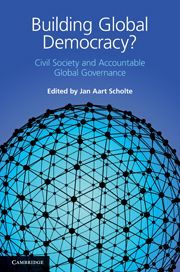Book contents
- Frontmatter
- Contents
- List of figures
- Participants in the Gothenburg Workshop
- List of contributors
- Editor's acknowledgements
- List of abbreviations
- Introduction
- 1 Global governance, accountability and civil society
- 2 Civil society and accountability of the United Nations
- 3 The World Bank and democratic accountability: the role of civil society
- 4 Civil society and IMF accountability
- 5 Civil society and the WTO: contesting accountability
- 6 Civil society and accountability in the Commonwealth
- 7 The Organisation of the Islamic Conference: accountability and civil society
- 8 Civil society and patterns of accountability in the OECD
- 9 Civil society and G8 accountability
- 10 Structuring accountability: civil society and the Asia-Europe Meeting
- 11 Civil society and accountability in the global governance of climate change
- 12 Civil society and accountability promotion in the Global Fund
- 13 Accountability in private global governance: ICANN and civil society
- 14 Civil society and the World Fair Trade Organization: developing responsive accountability
- Conclusion
- Bibliography
- Index
12 - Civil society and accountability promotion in the Global Fund
Published online by Cambridge University Press: 05 June 2012
- Frontmatter
- Contents
- List of figures
- Participants in the Gothenburg Workshop
- List of contributors
- Editor's acknowledgements
- List of abbreviations
- Introduction
- 1 Global governance, accountability and civil society
- 2 Civil society and accountability of the United Nations
- 3 The World Bank and democratic accountability: the role of civil society
- 4 Civil society and IMF accountability
- 5 Civil society and the WTO: contesting accountability
- 6 Civil society and accountability in the Commonwealth
- 7 The Organisation of the Islamic Conference: accountability and civil society
- 8 Civil society and patterns of accountability in the OECD
- 9 Civil society and G8 accountability
- 10 Structuring accountability: civil society and the Asia-Europe Meeting
- 11 Civil society and accountability in the global governance of climate change
- 12 Civil society and accountability promotion in the Global Fund
- 13 Accountability in private global governance: ICANN and civil society
- 14 Civil society and the World Fair Trade Organization: developing responsive accountability
- Conclusion
- Bibliography
- Index
Summary
Introduction
The debate on civil society and accountable global governance involves two important questions. What role does civil society play in ensuring accountability of global institutions? And to what extent is civil society itself accountable to its own constituencies? This chapter explores these issues in relation to the Global Fund to Fight AIDS, Tuberculosis and Malaria (hereafter abbreviated to ‘the Global Fund’ or ‘GFATM’).
In pursuing this analysis, civil society is understood to cover a range of collective actors outside of states and formal political parties, and characterised by the voluntary (non-profit) nature of their association. The range of civil society organisations (CSOs) includes social movements, labour unions and other workers' associations, non-governmental organisations (NGOs), community-based organisations (CBOs), clan and kinship networks, professional associations and any other bodies not motivated by profit. However, recent considerations of the social contract between the state and its citizens in the context of globalisation place particular emphasis on NGOs, especially when they take on the role of providing public services in the place of government.
Accountability is understood here along four dimensions: doing what is right in line with the organisation's goals; doing no harm; taking responsibility for the organisation's policies and actions; and correcting mistakes. The first two aspects of accountability require voice or participation (termed ‘consultation’ in Chapter 1 of this book), so that a broad spectrum of interests is considered in decision-making.
- Type
- Chapter
- Information
- Building Global Democracy?Civil Society and Accountable Global Governance, pp. 245 - 266Publisher: Cambridge University PressPrint publication year: 2011
- 2
- Cited by

